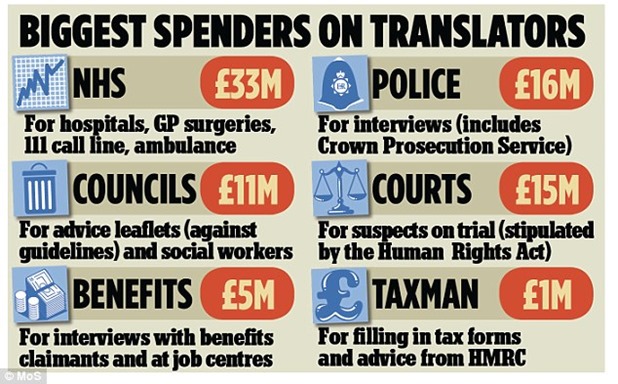Sven Longshanks
Daily Stormer
January 12, 2015

The British people are being fleeced of £100 million every year to pay for interpreters to make life easier for the foreign troops invading the country.
On top of this, the foreign parasites then use the interpreters for things like ensuring they can claim as many benefits as possible and explaining what medication they need to be provided with for their long-term diseases and disabilities, all at further expense to the nation.
Even when they commit crimes, instead of just shipping them out of the country they have to be given an interpreter, and if there is not one available, then they can just appeal the decision later and get it thrown out of court.
We need to stop providing interpreters and just deport them if they cannot speak English. If they cannot even speak the language, then they are not going to be of any use whatsoever to the people that do.
Taxpayers are spending £100million every year on interpreters to help immigrants who cannot speak English, a Mail on Sunday investigation has found.
Police, town halls, hospitals and courts are all spending huge sums on translating documents and providing professional interpreters to assist people with poor English.
This is despite repeated Government attempts to save money and improve social cohesion by making new arrivals take English tests, and by telling councils not to waste money on translating leaflets.
It can be revealed today that:
- A hospital trust in the North West uses interpreters 74 times each day.
- Britain’s biggest police force spends nearly £7 million a year on interpreters for crime suspects – mostly Romanian – and victims.
- One council helps people who speak a total of 61 different languages, including the little-spoken Fulani, Karen, Kinyarwanda, Shona, Tagalog and Visayan.
- Polish is by far the most commonly translated language by courts, police and councils.
- A US firm makes more than £10 million a year from the interpreting ‘industry’.
Last night critics said that, at a time when budgets are being slashed by the Government, key public services can ill afford to spend millions of pounds to help immigrants who have not learned English.
And they argued that translating can ultimately leave foreign language-speakers worse off – as they are less likely to get well-paid jobs in this country if they have not learned the language.
Communities Secretary Eric Pickles said: ‘The guidance I’ve issued is crystal-clear – councils should stop wasting taxpayers’ money by translating into foreign languages. Translation holds people back from integrating into British society. If they can’t speak English, they’re not going to get on. Money saved can be used to protect frontline services and keep council tax down.’
Under the Freedom of Information Act, The Mail on Sunday asked public bodies across England to detail their costs for written translation of documents and face-to-face or telephone interpreting.
Responses from 585 organisations, about two-thirds of those contacted, revealed they had spent £79 million in 2013-14, indicating that the total figure is well over £100 million. Most goes on face-to-face interpreters rather than document translation, which can be done free online.
In the NHS, the sum spent on foreign language services has risen by 41 per cent over the past four years to reach at least £33 million. Dozens of hospitals failed to respond to our data requests.
The biggest health spender is Homerton University Hospital NHS Foundation Trust in East London, which spent £1.2 million in a year.
Some hospitals have even installed full-time interpreters on their wards, such is the demand they face. But the details obtained by this newspaper indicate poor control of spending in some trusts.
In one instance last January, a Bengali interpreter charged £126 for more than three hours’ work, even though the interpretation took only ten minutes, during an endoscopy procedure.
In another, the Trust was charged £162 for 4.5 hours’ work by an Arabic interpreter, which in fact took 30 minutes during a home visit.
Meanwhile a health board in Brighton translated a ‘short video explaining what a clinical commissioning group is’ into five languages, at a cost of £7,500.
Another spent £1,678 on translating leaflets about ‘the importance of registering with a GP’.
One physiotherapist in South-West London reported having four appointments in a day – with an interpreter required at each.
NHS organisations claim that offering translation and interpretation services to those with poor English is a ‘mandatory requirement’.
It should be a mandatory requirement to be a descendant of the people who created the NHS to be able to use it.
The same goes for every other institution in Britain.
If the inheritance does not belong to you, then you have no right to take part in it, no matter what the the Human Rights Act says.
 Daily Stormer The Most Censored Publication in History
Daily Stormer The Most Censored Publication in History



